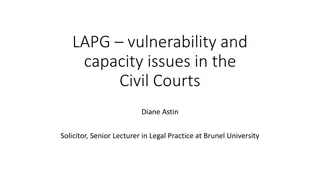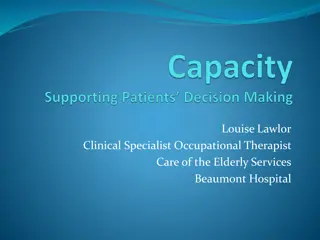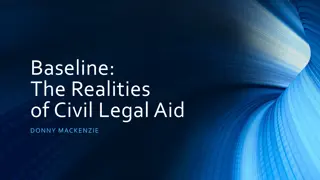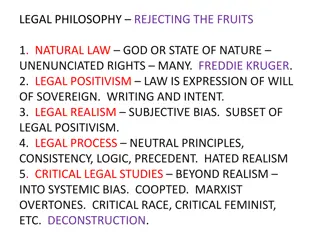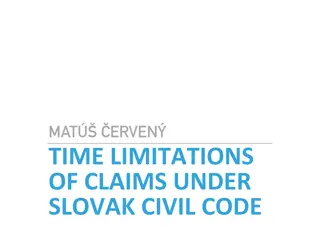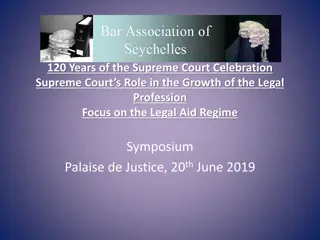Legal Capacity and Rights under the German Civil Code (BGB)
The German Civil Code, known as the BGB, outlines legal capacity, rights, and obligations under its five main books. It covers concepts like Rechtsfähigkeit, Handlungsfähigkeit, Geschäftsfähigkeit, and Deliktsfähigkeit. Legal capacity is crucial for entering into contracts, with different levels recognized based on age and circumstance. The BGB also delves into the rights of individuals before and after birth, as well as the cessation of legal capacity upon death. Understanding these principles is vital in navigating the legal landscape in Germany.
Download Presentation

Please find below an Image/Link to download the presentation.
The content on the website is provided AS IS for your information and personal use only. It may not be sold, licensed, or shared on other websites without obtaining consent from the author. Download presentation by click this link. If you encounter any issues during the download, it is possible that the publisher has removed the file from their server.
E N D
Presentation Transcript
The Brgerliches Germany. In development since 1881, it became effective on 1 1st st January B rgerliches Gesetzbuch January 1900 Gesetzbuch (or BGB) is the civil code of 1900. Consequently, the BGB contains five five books books: the General General Part Part ("Allgemeiner Teil"), sections 1 through 240 the sections 241 through 853 Law Law of of Obligations Obligations ("Recht der Schuldverh ltnisse"), the Property Property Law Law ("Sachenrecht"), sections 854 through 1296 the Family Family Law Law ("Familienrecht"), sections 1297 through 1921 the Succession Succession Law Law ("Erbrecht")
Difference between: Rechtsf higkeit = legal capacity Handlungsf higkeit = capacity to act Gesch ftsf higkeit = capacity to contract Deliktsf higkeit = legal capacity to commit tortious acts
Legal Capacity rights and obligations Legal Capacity = the capacity of being the subject of your own A child still living in the womb (Nasciturus) has no legal capacity; to obtain legal capacity, the completion of birth is necessary However, the Nasciturus is not left without any rights at all; for example, it can possess claims for prenatal injuries only if born alive
The legal capacity of a natural person ends with their death. What death means is not legally defined, but it is to be established through medical science (brain death criterion). Proof of death is done with the help of the Death Register. If a person disappears, a declaration of death should be made in accordance with the Law of Missing Persons (Verschollenheitsgesetz)
= ability to effectively enter legal transactions Full age of 18 contract is valid Full capacity capacity to to contract contract = when the person has reached the Limited age of 7 but is under 18 contract is valid in case of consent or ratification of the legal representative or if the contract represents only a legal benefit for the child or if the minor effects the payment with own means that were given to him for this purpose or for free disposal by the legal representative or by a third party with the ratification of the representative Limited capacity capacity to to contract contract = a minor who has reached the
Partial If the legal representative, with the ratification of the family court, authorises the minor to operate a trade or business independently, the minor has unlimited capacity to contract for such transactions If the legal representative authorises the minor to enter service or employment, the minor has unlimited capacity to enter into transactions that relate to entering or leaving service or employment of the permitted nature or performing the duties arising from such a relationship Partial capacity capacity to to contract contract: Incapacity person is in a state of pathological mental disturbance, which prevents the free exercise of will, unless the state by its nature is a temporary one contract is invalid with one exception: If a person of full age incapable of contracting enters into an everyday transaction that can be effected with funds of low value, the contract he enters into is regarded as effective Incapacity to to contract contract = if the child is not 7 years old yet or if the
= ability to commit a tort which results into a damage for which compensation is mandatory No not responsible for damage caused to another person. No capacity capacity = a person who has not reached the age of 7 is Limited of 18 is responsible for damage he inflicts on another person if, when committing the damaging act, he does have the insight required to recognise his responsibility. Exception:A person who has reached the age of 7 but not the age of 10 is responsible for damage that he inflicts on another party in an accident involving a motor vehicle, a railway or a suspension railway if he intentionally caused the injury. Limited capacity capacity = a person who has not yet reached the age Full Full capacity capacity = when the person has reached the age of 18.
= associations or assets recognized by the law as legal entities having distinct legal personality Types of legal persons Types of legal persons (in Civil Law): Associations (Vereine) Foundations (Stiftungen) Other private companies
= permanently established affiliation of persons having a common purpose and a corporate constitution Types Types: Non commercial business operations acquires legal personality by entry in the register of associations of the competent local court [Amtsgericht] e.g. Employers' Organization, Ambulatory Health Association, Home and Landowners Association Non- -commercial commercial association association: An association whose object is not Commercial commercial business operations acquires legal personality, for lack of special provisions under federal law, by state grant. The grant is in the power of the Land in whose territory the association has its seat. Debt Collector Association, Real Estate Market, Shopping center for officials / union members, Private medical settlement offices Commercial association association: An association whose object is
= totality of assets endowed with legal personality for the realization of the purposes of the founder Foundations are composed only of assets, they have no members; even those who benefit from the foundation are neither members nor organs of the foundation. The purpose of the foundation occurs from the declaration of will of the founder. The creation of a foundation with legal personality requires an foundation by the competent public authority of the Land in which the foundation is to have its seat. endowment transaction and recognition of the The foundation has a distinct legal personality.
The creditors for its liabilities. It has an authoried capital split up into shares. The joint joint- -stock stock corporation corporation (AG): Only the corporate assets are liable to the Partnership board personally liable partners. Partnership limited limited by by shares shares (KGaA): Joint-stock corporation that has on the Company commercial company with a separate legal personality which can be established for any legally permissible purpose. The shareholders participate in the company through ownership of one or more shares in the company's share capital. As a result of its separate legal personality, when the company enters into transactions with third parties, its shareholders are not personally liable towards those third parties. Company with with limited limited liability liability (GmbH):The German limited liability company is a Registered voluntarily to meet their common economic, social, and cultural needs and aspirations through a jointly owned and democratically controlled business. Registered cooperative cooperative (eG): an autonomous association of people united Mutual an association, which intends to perform insurance of its members under the principle of reciprocity. Mutual insurance insurance association association (VVaG): a particular legal form for insurers, namely
Public corporations based, e.g. church congregation, German Medical Chamber, professional associations Public corporations (K rperschaften): member- Public institutions broadcasting institutions, hospitals, public libraries, Deutsche Bundesbank Public institutions (Anstalten): user-based, e.g. Public foundations people, just assets Public foundations (Stiftungen): no association of
Thank you for your attention!
















